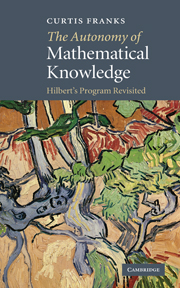Preface
Published online by Cambridge University Press: 07 January 2010
Summary
When I decided to bundle my recent historical, philosophical, and logical research together into a book, I considered two different approaches. One approach was to try to represent David Hilbert's foundational program exhaustively, to let my own findings simply shape the re-telling of a fairly familiar story. Another approach – the one that I ultimately preferred – was to center the book around what I think are both the most important and most overlooked aspects of Hilbert's program. There is no lack of high quality writing about Hilbert, nor of high quality development of his scientific innovations, but there seems to me to be a glaring oversight of one truly unique aspect of Hilbert's thought. So this book is a modest attempt to isolate, explain, and develop a single strain of Hilbert's philosophy. If the book inspires new interest and appreciation of Hilbert, then it has served its purpose.
The core of the book grew out of my doctoral research at the University of California's Department of Logic and Philosophy of Science in Irvine. The title of my doctoral thesis, “Mathematics speaks for itself,” was a double entendre. It was meant to suggest two distinct but related themes. The first theme is that questions about mathematics that arise in philosophical reflection – questions about how and why its methods work – might be best addressed mathematically. I believe that this is so, and I claim that David Hilbert held the same view.
- Type
- Chapter
- Information
- The Autonomy of Mathematical KnowledgeHilbert's Program Revisited, pp. ix - xiPublisher: Cambridge University PressPrint publication year: 2009
- 1
- Cited by



